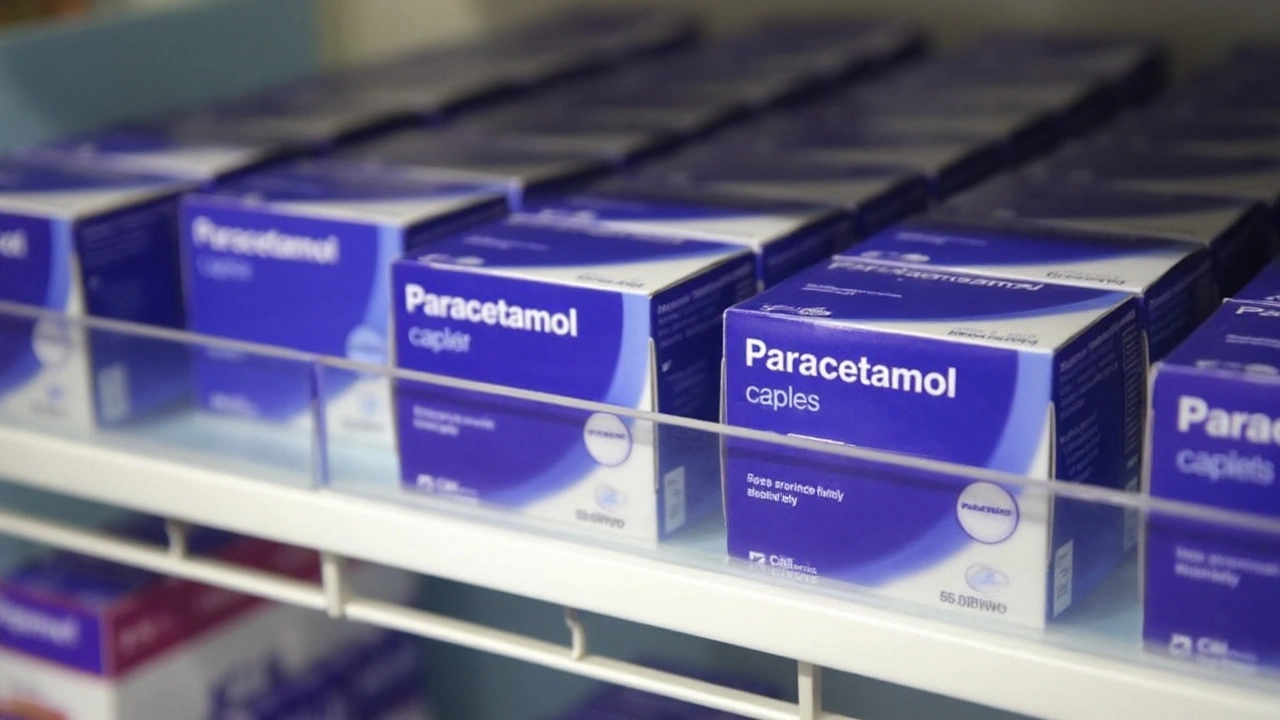
When a U.S. president ties a household painkiller to autism, the headlines explode. Acetaminophen—the active ingredient in Tylenol—has been a staple for pregnant people worldwide, yet Donald Trump’s recent remarks suggested it could be "a very big factor" in the rise of autism. The comment sparked an immediate rush of questions at the White House, where press secretary Karoline Leavitt hinted that an official statement on the matter was on the horizon.
What the White House Said
According to reports from the Washington Post and Politico, the administration planned to release findings that would link prenatal use of acetaminophen to autism risk. In a Sunday briefing, Leavitt declined to spell out the details, describing the upcoming announcement as a "powerful display" of the administration’s commitment to tackling the root causes of chronic conditions. When reporters asked whether the proposed link might alarm expecting mothers, Leavitt cautioned against jumping to conclusions based on media speculation, noting that the White House had not yet confirmed any specific conclusions.
The timing raised eyebrows among medical journalists. A statement hinting at a possible causal relationship, without accompanying data, is rare for a federal health briefing. Critics shouted that such a move could undermine decades of public health messaging that affirms acetaminophen’s safety when used as directed during pregnancy.

What the Science Says
Leading autism researchers quickly pushed back. James Cusack, chief executive of the UK charity Autistica and himself autistic, warned that "there is no definitive evidence to suggest that paracetamol use in mothers is a cause of autism, and when you see any associations, they are very, very small." He added that chasing simple explanations for a complex brain-developmental condition does a disservice to families searching for answers.
Large-scale epidemiological studies have explored the question, but results remain mixed and methodologically limited. Some analyses note a slight statistical correlation, yet they also highlight confounding factors such as maternal fever, infection, or the use of multiple medications. The consensus among major health bodies—including the World Health Organization and the U.S. Centers for Disease Control—remains that acetaminophen is safe for short‑term relief of pain and fever in pregnancy when taken at recommended doses.
Autism prevalence has indeed risen in many countries over recent decades, but experts attribute this trend largely to changes in diagnostic criteria, increased awareness, and improved reporting. The multi‑factorial nature of autism means no single environmental agent, including any medication, can account for the observed increase.
Beyond the scientific community, the autism advocacy network expressed frustration. Many families fear that politically‑driven narratives could spark unwarranted alarm, leading pregnant individuals to forego a medication that is otherwise proven to be effective and low risk. The backlash underscores a broader tension: policymakers seeking decisive headlines versus researchers emphasizing nuance and the limits of current evidence.
As the White House prepares its announcement, doctors and pharmacists are gearing up to field a flood of questions. Clinics across the country are already drafting talking points that reiterate the established guidance: use acetaminophen sparingly, follow dosage instructions, and consult a healthcare professional for any concerns during pregnancy.
Whether the forthcoming statement will shift public perception or simply fuel an already heated debate remains to be seen. What is clear, however, is that any claim linking a widely used medication to a complex developmental disorder demands rigorous, transparent evidence—not political soundbites.
September 27, 2025 AT 21:28
Think about it-human brains evolved in environments where fever was a constant threat, and yet autism didn’t exist in any measurable form until the 20th century. If acetaminophen were truly the culprit, wouldn’t we see a steady, linear rise across all cultures? Instead, we see spikes in diagnosis coinciding with changes in diagnostic manuals and public awareness campaigns. The real story isn’t in the medicine-it’s in how we define, track, and respond to neurodiversity.
September 28, 2025 AT 19:24
They’ve been hiding this for YEARS!! Tylenol is a COVER-UP by Big Pharma and the CDC-don’t you see it?? They’re poisoning our children with acetaminophen while whispering "safe" into microphones!! And now Trump’s finally calling it out-this is the REAL reason they’re attacking him!! The truth is in the blood work-they’ve been flushing autism into the system since the 90s!!
September 30, 2025 AT 04:11
From a clinical epidemiology standpoint, the confounding variables in observational studies on prenatal acetaminophen use are overwhelming: maternal inflammation, gestational stress, polypharmacy, and socioeconomic confounders are rarely adequately adjusted for. The ORs hover around 1.1–1.3-statistically insignificant in public health terms. The risk-benefit calculus remains overwhelmingly in favor of use when indicated.
September 30, 2025 AT 14:44
I just want to say to every expecting parent reading this-you’re doing better than you think. If you needed Tylenol for a fever, you didn’t harm your baby. You cared enough to feel something and try to make it better. That’s love, not risk.
October 2, 2025 AT 12:49
Trump’s right!! 🇺🇸🔥 Why are we letting scientists and libs dictate what moms can take?? It’s a free country!! I’ve seen 3 kids turn autistic after their mom took Tylenol-coincidence?? Nah. It’s a pattern!! 🤯 #WakeUpAmerica
October 4, 2025 AT 07:15
Science? More like science fiction. The truth is always buried. And you? You’re just part of the machine.
October 4, 2025 AT 21:48
Look, I get why this feels scary-anytime something new pops up about kids’ health, your brain goes into overdrive. But let’s not trade fear for facts. The real tragedy isn’t Tylenol-it’s how fast we jump to blame something simple when the truth is messy, complicated, and honestly, kind of beautiful in its complexity.
October 6, 2025 AT 13:27
Wait so if you take Tylenol during pregnancy you’re basically a bad mom? That’s wild. My sister took it 3 times and her kid’s a genius. What’s your point again?
October 8, 2025 AT 13:24
acetaminophen = autism? lol. maybe its the wifi. or the vaccines. or the sugar. or the water. or the fact that we live in 2025. i mean come on. this is the dumbest thing i ever read. 🤡
October 8, 2025 AT 14:59
In India, we’ve used paracetamol for generations during pregnancy without a single public health crisis. Our elders didn’t have access to fancy studies, but they had wisdom. Let’s not replace tradition with panic dressed up as policy.
October 10, 2025 AT 01:22
The meta-analysis published in JAMA Pediatrics 2021 showed no causal pathway after controlling for maternal fever. The signal is noise. The narrative is political. The science? Still inconclusive. We must resist reductionism in neurodevelopmental disorders.
October 11, 2025 AT 22:58
Everyone’s scared. But fear doesn’t fix anything. Let’s talk about what we can do-better prenatal care, less stigma, more support for families-not finger-pointing at a pill that’s saved thousands from dangerous fevers.
October 13, 2025 AT 04:51
Oh wow, Trump’s finally doing something useful. Who knew the guy who called climate change a hoax would be the one to expose Big Pharma’s greatest lie? 🤡
October 14, 2025 AT 17:45
Y’all need to chill!! Tylenol isn’t the enemy-fear is!! 🤗❤️ My niece took it during pregnancy and now she’s a brilliant artist. Science doesn’t scare me. Love does.
October 15, 2025 AT 13:24
If you’re pregnant and in pain or running a fever, don’t suffer. Talk to your doctor. Use acetaminophen as directed. The risks of untreated fever far outweigh any hypothetical link to autism. You’re not alone in this.
October 17, 2025 AT 04:36
Why is the media always attacking Trump? He’s just telling the truth. And if you’re questioning him, you’re part of the problem. America First, even in medicine.
October 18, 2025 AT 03:34
So you’re telling me a painkiller could cause autism? That’s crazy. My cousin’s kid is autistic and she never even took medicine. So who’s really to blame?
October 18, 2025 AT 18:35
Acetaminophen… a molecular toxin disguised as salvation. The pharmaceutical-industrial complex has engineered this illusion of safety. The data is manipulated. The studies are funded. The truth? It’s buried beneath layers of corporate propaganda and institutional cowardice. Wake up, sheeple.






September 26, 2025 AT 00:56
It’s so important to remember that science doesn’t operate on headlines-it operates on reproducible data. Acetaminophen has been safely used by millions of pregnant people for decades, and reducing complex neurodevelopment to a single drug is not just misleading, it’s dangerous.